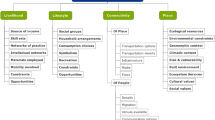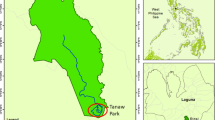Abstract
This paper investigates how the agency of local residents can affect persistent and unsustainable practices in urban water supply governance. Using a case study from Bangalore, India, we analyze a social–ecological trap which developed after a shift to external water provision paired with rapid urbanization. The reluctance of forsaking initial investments in infrastructure and competence, and the subsequent loss of the local network of lakes built for harvesting rainwater, reinforced dependence on external sources while undermining groundwater levels in the city. These feedbacks made water scarcity a structurally persistent feature of Bangalore. This situation started to change when local residents recently started organizing to preserve and restore Bangalore’s lakes. By entering collaborative management agreements with municipal authorities, these lake groups have restored and established effective protection of five lakes. Through a case study of this civic engagement we show that the lake restorations have the potential to counteract trap mechanisms by restoring ecological functions, and by reducing water scarcity as groundwater levels rise and authorities are relieved from maintenance and monitoring tasks. Importantly, these lake groups have also created opportunities for over a dozen similar groups to form across the city. This demonstrates that social movements can be an important source of change in social–ecological traps.


Similar content being viewed by others
References
Allison HE, Hobbs RJ (2004) Resilience, adaptive capacity, and the “lock-in trap” of the Western Australian Agricultural Region. Ecol Soc 9
Andersson E, Enqvist J, Tengö M (2017) Stewardship in urban landscapes. In: Bieling C, Plieninger T (eds) The science and practice of landscape stewardship. Cambridge University Press, Cambridge (in press)
Bangalore Mirror Bureau (2013) Linganamakki water to Bangalore is a joke. Bangalore Mirror. Bangalore, Karnataka, India
Berkes F (2010) Shifting perspectives on resource management: resilience and the reconceptualization of “natural resources” and “management”. MAST 9:13–40
Berkes F, Colding J, Folke C (2003) Navigating social–ecological systems: building resilience for complexity and change. Cambridge University Press, Cambridge
Boonstra WJ, de Boer FW (2014) The historical dynamics of social–ecological traps. Ambio 43:260–274
Boonstra WJ, Joosse S (2013) The social dynamics of degrowth. Environ Values 22:171–189
BWSSB (2014) Meeting the vital need for water—a golden journey. Bengaluru Water Supply and Sewerage Board, Bangalore
BWSSB. n.d. A (2014) Water supply and sources. http://bwssb.org/water-supply-sources/
BWSSB. n.d. B (2014) Water supply and sources—Chamarajsagar Reservoir. http://bwssb.org/water-supply-sources-chamaraja-sagar-reservoir/
BWSSB. n.d. C (2014) Mission and history. http://bwssb.org/mission-history/
BWSSB. n.d. D (2014) Current projects. http://bwssb.org/current-projects/
BWSSB. n.d. E (2014) Current projects 2. http://bwssb.org/current-projects-2/
BWSSB. n.d. F (2014) Current projects 3. http://bwssb.org/current-projects-3
BWSSB. n.d. G (2014) Current projects 4. http://bwssb.org/current-projects-4/
BWSSB. n.d. H (2014) Rain water harvesting (RWH). http://bwssb.org/rain-water-harvestingrwh/
BWSSB. n.d. I (2014) Rain water harvesting. http://bwssb.org/rain-water-harvesting/
Carpenter SR, Brock WA (2008) Adaptive capacity and traps. Ecol Soc 13
Central Ground Water Board (2013) Ground water information booklet—Bangalore Urban District, Karnataka. Ministry of Water Resources, Government of India, Faridabad
Cinner JE (2011) Social–ecological traps in reef fisheries. Glob Environ Change 21:835–839
Citizen Matters (2014) Water found at 9 feet below ground level on Sarjapura Road. Citizen Matters—Bangalore news, views and opinions. Bangalore, Karnataka, India
Creswell JW (2014) Research design: qualitative, quantitative, and mixed methods approaches, 4th edn. Sage Publications, Los Angeles
D’Souza R, Nagendra H (2011) Changes in public commons as a consequence of urbanization: the Agara lake in Bangalore, India. Environ Manag 47:840–850
Deccan Chronicle (2013) Cauvery stage V to bring in more water. Deccan Chronicle, Bangalore
Diani M, McAdam D (2003) Social movements and networks: relational approaches to collective action. Oxford University Press. Oxford, UK
Dikshit GS, Kuppuswamy GR, Mohan SK (1993) Tank irrigation in Karnataka—a historical survey. Gandhi Sahitya Sangha, Bangalore
Dorado S (2005) Institutional entrepreneurship, partaking, and convening. Organ Stud 26:385–414
Enqvist J, Tengö M, Bodin Ö (2014) Citizen networks in the Garden City: protecting urban ecosystems in rapid urbanization. Landsc Urban Plan 130:24–35
Enqvist J, Tengö M, Luna F (2016) Emergence and spread of an urban environmental stewardship network (Manuscript)
Ernstson H (2011) Transformative collective action: a network approach to transformative change in ecosystem-based management. In: Bodin Ö, Prell C (eds) Social networks and natural resource management: uncovering the social fabric of environmental governance. Cambridge University Press, Cambridge, pp 255–287
Friese S (2012) Qualitative data analysis with ATLAS.ti. SAGE Publications Ltd, London
Government of India (2011) Cities having population 1 lakh and above. Pages 1–13. Census of India 2011—Provisional Population Totals. Delhi, India
Gowda K, Sridhara MV (2007) Conservation of tanks/lakes in the Bangalore metropolitan area. Manag Environ Qual Int J 18:137–151
Grönwall J, Mulenga M, McGranahan G (2010) Groundwater, self-supply and poor urban dwellers—a review with case studies of Bangalore and Lusaka. London, UK
Gunderson LH, Holling CS (2002) Panarchy: understanding transformations in human and natural systems. Island Press, Washington DC
Hardin G (1968) The tragedy of the commons. Science 162:1243–1248
Hechter M, Pfaff S, Underwood P (2016) Grievances and the genesis of rebellion: mutiny in the Royal Navy, 1740 to 1820. Am Sociol Rev 81:165–189
Holling CS, Meffe GK (1996) Command and control and the pathology of natural resource management. Conserv Biol 10:328–337
Holling CS, Gunderson LH, Peterson GD (2002) Sustainability and Panarchies. In: Gunderson LH, Holling CS (eds) Panarchy: understanding transformations in human and natural systems. Island Press, Washington DC, pp 63–102
Janssen MA, Scheffer M (2004) Overexploitation of renewable resources by ancient societies and the role of sunk-cost effects. Ecol Soc 9
Kvale S, Brinkmann S (2009) Interviews: learning the craft of qualitative research interviewing. SAGE Publications Ltd, Los Angeles
Lele S, Srinivasan V, Jamwal P, Thomas BK, Eswar M, Zuhail TM (2013) Water management in Arkavathy Basin—a situation analysis. Ashoka Trust for Research in Ecology and the Environment, Bengaluru
Luna F (2014) Transformation of urban lake governance in Bangalore, India. Stockholm University, Sweden
Mahoney J (2000) Path dependence in historical sociology. Theory Soc 29:507–548
Manipal World News (2014) Bangalore: Mekedatu water for Cauvery stage V project. Manipal World News, Manipal
Nagendra H (2010) Maps, lakes and citizens. Pages 19–23 Seminar 613. ATREE
Nagendra H, Ostrom E (2014) Applying the social-ecological system framework to the diagnosis of urban lake commons in Bangalore, India. Ecol Soc 19
Nagendra H, Sudhira HS, Katti M, Tengö M, Schewenius M (2012) Urbanization, ecosystems and biodiversity: assessments of India and Bangalore. The Secretariat for the Convention of Biological Diversity, Montreal
Olsson P, Folke C, Hahn T (2004) Social–ecological transformation for ecosystem management: the development of adaptive co-management of a Wetland Landscape in Southern Sweden. Ecol Soc 9
Ostrom E (1990) Governing the commons: the evolution of institutions for collective action. Cambridge University Press, Cambridge
Pfaffenberger B (1992) Technology dramas. Sci Technol Hum Values 17:282–312
Raju KV, Manasi S, Latha N (2008) Emerging ground water crisis in urban areas—a case study of ward no. 39, Bangalore city
Saleth RM, Sastry GS (2004) Water supply and sanitation sector of Karnataka, India: status, performance and change. Water Policy 6:161–183
Sastry GS (2008) Emerging development issues of Greater Bangalore. Working Paper 194. Institute for Social and Economic Change, Bangalore, India
Sawkar RH (2012) Evaluation of surface, ground and sewage water for sustainable supply of potable water to. J Geol Soc India 80:877–880
Scheffer M, Westley FR (2007) The evolutionary basis of rigidity: locks in cells, minds, and society. Ecol Soc 12
Scheffer M, Carpenter S, Foley JA, Folke C, Walker B (2001) Catastrophic shifts in ecosystems. Nature 413:591–596
Srinivas S (2001) Landscapes of urban memory: the sacred and the civic in India’s high-tech city. University of Minnesota Press, Minnesota
Steneck RS, Hughes TP, Cinner JE, Adger WN, Arnold SN, Berkes F, Boudreau SA, Brown K, Folke C, Gunderson L, Olsson P, Scheffer M, Stephenson E, Walker B, Wilson J, Worm B (2011) Creation of a gilded trap by the high economic value of the Maine lobster fishery. Conserv Biol J Soc Conserv Biol 25:904–912
Subhash Chandra KC (2012) Demand, resource availability and status of water supply to Mega City—Bangalore, Karnataka. J Geol Soc India 79:543
Sudhira HS, Ramachandra TV, Subrahmanya MHB (2007) Bangalore. Cities 24:379–390
Suresh TS (2001) An urban water scenario: a case study of the Bangalore metropolis, Karnataka, India. In: Schumann AH, Acreman MC, Davis R, Marino MA, Rosbjerg D, Jun X (eds) Regional management of water resources. International Association of Hydrological Sciences, Maastricht, pp 97–104
Tarrow S (2011) Power in movement: social movements and contentious politics, 3rd edn. Cambridge University Press, New York
The Hindu (2013) Plans afoot to take up Cauvery 5th Stage scheme. The Hindu, Belgaum
The Hindu (2014) Panel suggests drawing water for Bangalore from Linganamakki. The Hindu, Bangalore
Times News Network (2013a) Now Sharavathi may be Bangalore’s lifeline. The Times of India, Bangalore
Times News Network (2013b) Cauvery V stage to quench thirst of Bangaloreans. The Times of India, Bangalore, Karnataka
Water Governance Facility (2013) Groundwater Governance in India: stumbling blocks for law and compliance. WGF Report No. 3. Stockholm, Sweden
Welch S (1975) Sampling by referral in a dispersed population. Public Opin Q 39:237–245
Westley FR, Tjornbo O, Schultz L, Olsson P, Folke C, Crona B, Bodin Ö (2013) A theory of transformative agency in linked social–ecological systems. Ecol Soc 18
Acknowledgments
The authors would like to thank all interviewees for the warm hospitality in Bangalore. We also thank Bhagyalakshmi Srinivas for the fieldwork assistance, Vanessa Masterson for comments on an early draft of this paper, and Patrick Keys for reviewing the language. This study has been carried out partly funded by the Swedish International Development Cooperation Agency (Sida), and by a core grant from the Swedish Foundation for Strategic Environmental Research (MISTRA).
Author information
Authors and Affiliations
Corresponding author
Additional information
Handled by Keith Tidball, Cornell University, USA.
Rights and permissions
About this article
Cite this article
Enqvist, J., Tengö, M. & Boonstra, W.J. Against the current: rewiring rigidity trap dynamics in urban water governance through civic engagement. Sustain Sci 11, 919–933 (2016). https://doi.org/10.1007/s11625-016-0377-1
Received:
Accepted:
Published:
Issue Date:
DOI: https://doi.org/10.1007/s11625-016-0377-1




